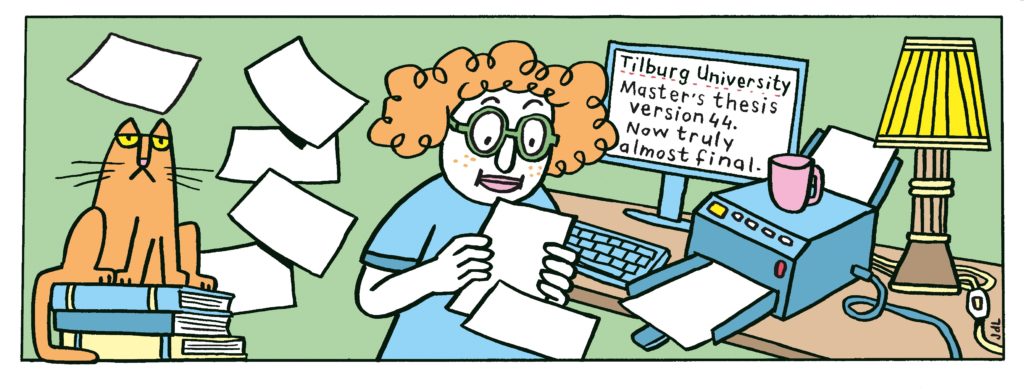The Tax Authorities: they can’t make it more fun, but they can make it more fair
After five years, ‘suddenly’ making an additional payment to the tax authorities? ‘A taxpayer is not responsible for a government error,’ Jelle Kanters argues in his Master’s thesis. ‘The inspector of the Tax Authorities neglected its duty to investigate.’

What is your thesis about?
‘The Tax Authorities have a huge task of checking all tax returns in the Netherlands. When someone files a tax return, the tax inspector has to levy an assessment on this. That means he checks the return and determines what someone has to pay.
‘But the Tax Authorities by no means checks all returns. When returns look neat and match information the Tax Authorities have already received (it gets income through from an employer and the bank balance from a bank), the Tax Authorities assume the return is correct.
‘Only if there is any doubt about a tax return is the inspector obliged to conduct an audit. Nevertheless, inspectors do not go through all of these returns because the Tax Authorities do not have the capacity to do so. To determine which returns they do check—the selection process—the Tax Authorities use certain methods. I examined two important methods: selection rules and risk profiles.’
What exactly did you research?
‘Selection rules are actually the most important selection method. We don’t know exactly what selection rules the Tax Authorities use because that is kept secret. Nevertheless, we have an inkling. For example, there may be selection rules about the income reported by the employer.
‘Imagine that my employer informs the Tax Authorities that my income for a whole year is €10,000 and I adjust that income to €9,000. In that case, my submitted return deviates: the income is lower than expected. This deviating income could be a criterion for the Tax Authorities to check my return.
‘In addition, you have risk profiles: a form of artificial intelligence. By collecting millions of checked returns—including all the elements of those returns—into a database, a trained algorithm can ‘predict’ whether inspectors should check new returns or not.
‘In my thesis, I examine the consequences of such a selection process, especially when things go wrong. Suppose a return contains an error, and in the selection process, it is ejected (marked as a potentially incorrect return, ed.) but not checked, or not ejected and automatically approved. I wanted to know what happens if the Tax Authorities do subsequently discover an error. Right now, a Tax Authorities inspector can still revisit an incorrect return years after automatic approval.’

What are the results of your research?
‘My first conclusion is that risk profiles currently seem to be completely useless. A major problem with an algorithm—and thus with a risk profile—is that we don’t know how it arrives at its decision. They provide no concrete indicator of where the error in a return lies. Some returns are enormously complex and contain many numbers. If a risk profile ejects a declaration as risky, where is the error? Does an auditor have to check an entire return like that? That is precisely what they want to prevent with this selection.
‘A selection rule, on the other hand, is much clearer. When a selection rule filters out a return, it specifically states why the return does not meet certain criteria. For example: ’the income deviates from the pre-filled income.’ In that case, the auditor knows exactly where to look.
‘But when an inspector does nothing with such a report and he approves the return, I do not think he/she should be allowed to go back on this in all cases. A declaration that surfaces on the basis of an accurate risk indication indicates that it is most likely incorrect. An inspector could then have known that there was an error in the return and did nothing about it. A taxpayer is not responsible for that error: the inspector neglected his/her duty to investigate.
Why do you think the responsibility lies with the inspector and not the person who files the return incorrectly?
‘My thesis is not about people who intentionally file an incorrect return. The inspector can always reclaim such a person—who is in bad faith. It’s about protecting people who make a human error and don’t have to ‘suddenly’ make an additional payment five years later. What is the point of such a final assessment if an inspector can always go back on it?
What would be your advice to the Tax Authorities?
‘I have two pieces of advice. On the one hand—if we look at the current situation—I think the government should take responsibility for the tax system they create themselves: they should solve themselves implementation problems. For example, by finding a way to check all the ejected returns.’
‘But a long-term solution is also needed to reduce the Tax Authorities’ audit task. For example, why do people who only have income from employment and a bank account have to file a tax return? The Tax Authorities already have all the data on these people. If that is no longer necessary, the number of income tax returns decreases enormously, and the checking process of all submitted returns becomes a lot clearer.’
Master’s thesis
Author: Jelle Kanters
Title: Selectie op wiens risico? Een onderzoek naar de formeelrechtelijke gevolgen van risicoselectie door de belastingdienst. (Selection at Whose Risk? A study of the procedural-law consequences of risk selection by the tax authorities.)
Supervisor: Diana van Hout
Grade: 8,5
Master: Tax Law






